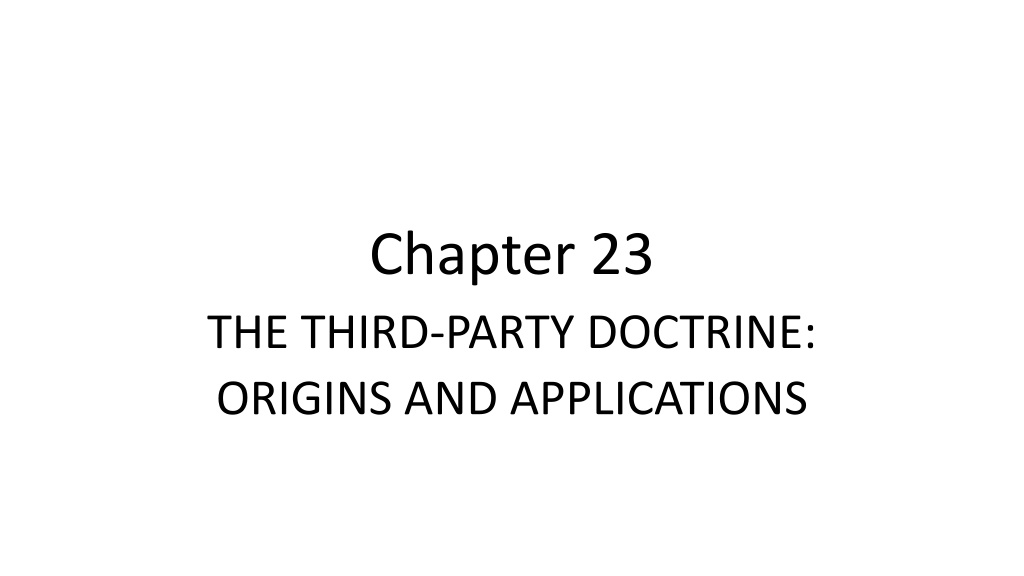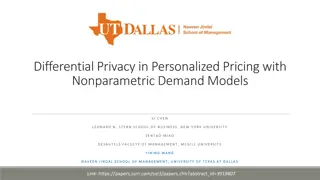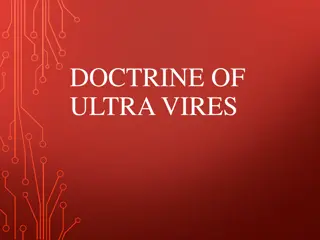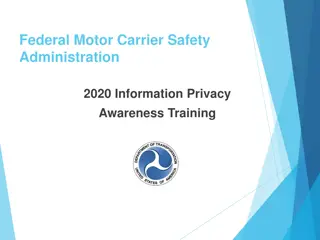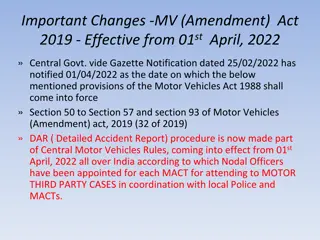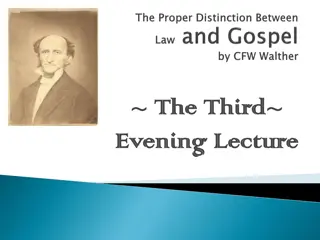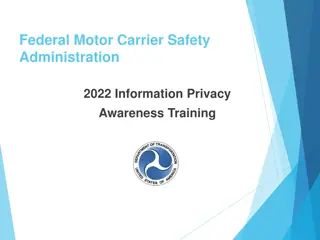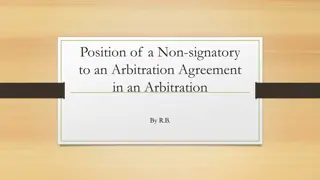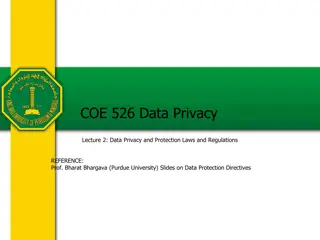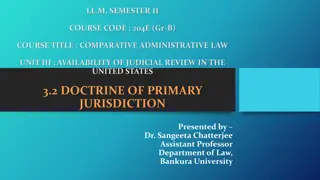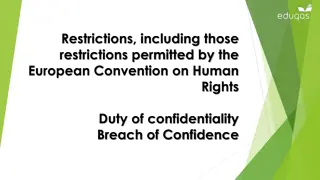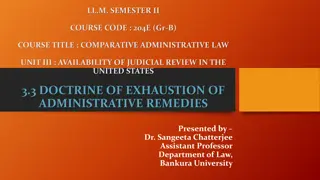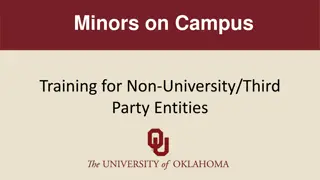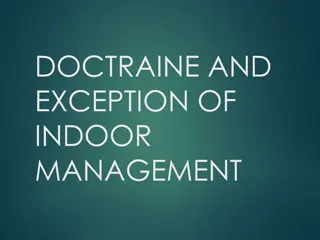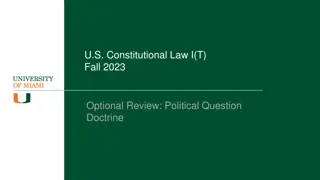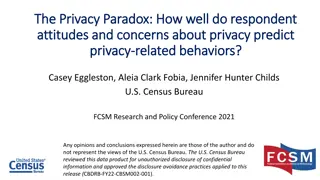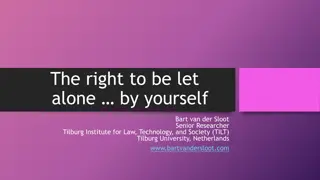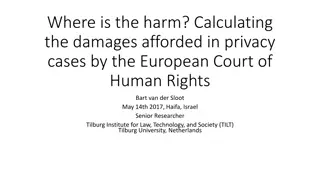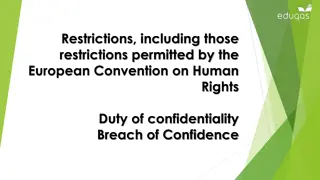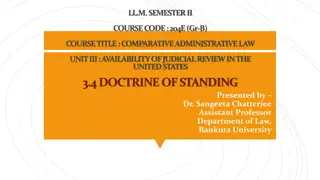Understanding the Third-Party Doctrine in Privacy Law
The discussion covers the origins and applications of the third-party doctrine in privacy law, referencing the landmark case of Smith v. Maryland. It explores concepts like pen registers, Katz test, and phone users' awareness of privacy regarding their call information. The implications of sharing information with third parties and the reasonable expectation of privacy in modern society are also examined.
Download Presentation

Please find below an Image/Link to download the presentation.
The content on the website is provided AS IS for your information and personal use only. It may not be sold, licensed, or shared on other websites without obtaining consent from the author. Download presentation by click this link. If you encounter any issues during the download, it is possible that the publisher has removed the file from their server.
E N D
Presentation Transcript
Chapter 23 THE THIRD-PARTY DOCTRINE: ORIGINS AND APPLICATIONS
Analog Phone Metadata - Smith v. Maryland, 442 U.S. 735 (1979) What is a pen What is a pen- -register and why did the police use them? register and why did the police use them? LUDs LUDs local usage details in police jargon. local usage details in police jargon. Were the customers of the phone company aware in 1979 that Were the customers of the phone company aware in 1979 that this information was being collected by the phone company? this information was being collected by the phone company? Only for their long Only for their long- -distance calls, which were individually distance calls, which were individually billed. Most phone plans did not charge for or list local calls. billed. Most phone plans did not charge for or list local calls. Why isn't the installation of the pen register a trespass to Why isn't the installation of the pen register a trespass to defendant? defendant? It is installed on phone company property. It is installed on phone company property. 2
What is the Katz Test? 1) whether the individual, by his conduct, has exhibited an actual (subjective) expectation of privacy, whether, in the words of the Katz majority, the individual has shown that he seeks to preserve [something] as private. 2) The second question is whether the individual s subjective expectation of privacy is one that society is prepared to recognize as reasonable whether, in the words of the Katz majority, the individual s expectation, viewed objectively, is justifiable under the circumstances. Remember this for Gorsuch s dissent in Carpenter.
What did Phone Users Know About the Privacy of the Numbers They Call? Telephone users, in sum, typically know that they must convey numerical information to the phone company; that the phone company has facilities for recording this information; and that the phone company does in fact record this information for a variety of legitimate business purposes. Although subjective expectations cannot be scientifically gauged, it is too much to believe that telephone subscribers, under these circumstances, harbor any general expectation that the numbers they dial will remain secret. Everyone still remembered phone company operators.
Even if the Subscriber Thought the Numbers Would Be Even if the Subscriber Thought the Numbers Would Be Private, is that Reasonable Private, is that Reasonable Miller on bank records: The depositor takes the risk, in revealing his affairs to another, that the information will be conveyed by that person to the Government. . . . This Court has held repeatedly that the Fourth Amendment does not prohibit the obtaining of information revealed to a third party and conveyed by him to Government authorities, even if the information is revealed on the assumption that it will be used only for a limited purpose and the confidence placed in the third party will not be betrayed. (United States v. Miller, 425 U.S. 435 (1976) ) 5
What did the Smith court say about the defendant's expectation of privacy? [E]ven if petitioner did harbor some subjective expectation that the phone numbers he dialed would remain private, this expectation is not one that society is prepared to recognize as reasonable. 6
Did Smith make new law? Prior to Smith federal agents had been able to get third- party data without a warrant or court order. While Katz did not change this practice, the reasonable expectation of privacy in Katz raised the question of how to apply the reasonable expectation of privacy test in other circumstances. Smith only recognized that the long-term status quo of obtaining third-party records without a warrant was still good law. 7
Smith and the Data Revolution Smith is 10 years before the earliest days of the public Internet. The first personal computers have just gone on the market. Apple 1 goes on sale in 1976 US$666.66 (equivalent to $3,032 in 2020) Large data sets are stored on centralized IBM computers and storage is expensive. Email is through corporate services run by telecom companies such as the Bells and MCI. Widely available/free email was in the future. The amount and extent of third-party data was relatively limited, and most of it, other than phone numbers, would have been familiar to James Madison. 8
The Dissents Warning Is this Really Assumption of Risk? Implicit in the concept of assumption of risk is some notion of choice. At least in the third-party consensual surveillance cases, which first incorporated risk analysis into Fourth Amendment doctrine, the defendant presumably had exercised some discretion in deciding who should enjoy his confidential communications. By contrast here, unless a person is prepared to forgo use of what for many has become a personal or professional necessity, he cannot help but accept the risk of surveillance. It is idle to speak of assuming risks in contexts where, as a practical matter, individuals have no realistic alternative.
Can the Government Undermine the Expectation of Privacy? More fundamentally, to make risk analysis dispositive in assessing the reasonableness of privacy expectations would allow the government to define the scope of Fourth Amendment protections. For example, law enforcement officials, simply by announcing their intent to monitor the content of random samples of first-class mail or private phone conversations, could put the public on notice of the risks they would thereafter assume in such communications. [This is a particular problem for new means of communications, such as email, text, app-based communication, etc.]
Applications of the Third- Party Doctrine We are discussing this section before Carpenter because Carpenter reviews some of this law. 11
Telephone Conversations There is a statutorily created expectation of privacy in the content of telephone calls, which has also been recognized as a constitutional right because it is become the reasonable expectation. The telecom companies do not routinely record the content telephone calls so there is no retrospective search of phone calls unless the data has been collected with that in mind. VOIP (voice over Internet) calls have recently been determined to be information services, not telecom services. The legal status of VOIP calls is murky.(Charter Advanced Services LLC v. Lange) 12
E-mail Content: U.S. v. Warshak, 631 F.3d 266 (6th Cir.(Ohio) 2010 Warshak was convicted based on the evidence in his emails that were obtained from his ISP without a probable cause warrant, but consistent with the requirements of the Stored Communications Act. He appealed, arguing that he had an expectation of privacy in his emails - to the extent that the Stored Communications Act allowed warrantless access to his emails, he argued it was unconstitutional. 13
The Stored Communications Act (1986) The Stored Communications Act provided an expectation of privacy for email held on remote servers for less than 180 days. Email left on the server for more than 180 days was assumed to be abandoned and could be obtained without a probable cause warrant. The SCA was passed long before cloud email. In the early days email was not left on the server but was downloaded to the user s computer and cleared from the server. Commercial email systems charged per message and for server storage. It was expensive to leave mail on the server so email over 180 days old was likely abandoned. Now most people have no local copy of their mailbox. Hint make a local copy of your mailbox. Thunderbird free email app that downloads your Gmail. 14
The Court's Assumption Like telephone conversations, simply because the phone company or the ISP could access the content of e-mails and phone calls, the privacy expectation in the content of either is not diminished, because there is a societal expectation that the ISP or the phone company will not do so as a matter of course. For years Gmail sent you advertising based on the content of your email. 15
Can the ISP change the customers reasonable expectation of privacy? Why does the contract with the ISP matter? What about email on the employer's computer? What about email on the University system? Does it matter whether the ISP really looks at the email, or only has the right to? What about Gmail - how is Google like the NSA when it comes to email? 16
The Courts Ruling The court found that the defendant had a reasonable expectation of privacy in all of his email, including email over 180 days old. To the extent that this conflicts with the SCA, the SCA is unconstitutional. Because the government complied with the SCA in good faith, the evidence was still admissible, and the conviction was sustained. While the Supreme Court has not ruled on this yet, Justice Gorsuch s dissent in Carpenter assumed that it should be the law. This protection does not extend to work, university, or other email services which contractually limit your expectation of privacy. There is no expectation of privacy for your email in the recipient s email system. 17
E-mail Headers, Addressing Information, and URLs Email metadata which includes addressing information, routing information, and in some cases locational URLs, looks a lot like Smith case phone metadata. The courts have found that this is available without a probable cause warrant. 18
Text Messages Text messages are content and for many people are the new phone call. The law seems be clear that there would be an expectation of privacy in text messages but the Supreme Court case on point was a special circumstances case. The court said there was a reasonable expectation of privacy, but the text was on a phone that belonged to the defendant s employer the police department. There is no expectation of privacy as to employer provided technology. There is no expectation of privacy on the recipient s phone. 19
Voiceprints and Voice Data Stored by Smart Speakers Do you allow you smart speakers such as Amazon Echo, Google Home, or Apple Homepod to eavesdrop on your life? Have you granted them access to your smart phone calendar and contacts or your e-mail account? Do you permit them to share your voiceprints with their manufacturer to improve recognition? Have you ever looked at the history of your voice commands (or of overheard conversations) that your speaking can create? Have you ever purged that history, if you can? These questions all present many of the same issues addressed in this chapter, with the added nuances that the device may record some speech that you do not voluntarily wish to convey to it and that the device is undeniably your property located inside your home.
Carpenter v. United States, 138 S. Ct. 2206 (2018) This was an unexpected bombshell in privacy law. Its effects are just beginning to percolate up through the district courts.
How Strong is Carpenter? Judgment: Reversed and remanded, 5-4, in an opinion by Chief Justice Roberts on June 22, 2018. Justice Kennedy filed a dissenting opinion, in which Justices Thomas and Alito joined. Justice Thomas filed a dissenting opinion. Justice Alito filed a dissenting opinion, in which Justice Thomas joined. Two of the 5-4 majority have been replaced with extremely conservative judges. Justice Gorsuch s dissenting opinion is a wild card, but can he get any support from the new judges? 22
Cell phone basics in 2018 (paraphrased Supreme Court version) There are 396 million cell phone service accounts in the United States for a Nation of 326 million people. Cell phones connect to a set of radio antennas called cell sites. Cell sites typically have several directional antennas that divide the covered area into sectors. Cell phones continuously scan their environment looking for the best signal, which generally comes from the closest cell site. Each time the phone connects to a cell site, it generates a time-stamped record known as cell-site location information (CSLI). The precision of this information depends on the size of the geographic area covered by the cell site. The greater the concentration of cell sites, the smaller the coverage area. CSLI is collected on calls, text, and internet connections. This data is created and retained by companies for their own use and for sale. 25
The Data The data: Location of the cell phone during connection by triangulated the towers that connect to the phone. Where will this location data be most accurate? (Where do you have the most towers?) What offsets the usefulness of this accuracy in these areas? The Uses Sale of aggregated data to marketers and others. Network maintenance. Roaming surcharges. Specific data to the police and surveillance agencies. 26
Carpenter in the Lower Courts In 2011, police officers arrested four men suspected of robbing a series of Radio Shack and (ironically enough) T-Mobile stores in Detroit. The suspect identified 15 accomplices who had participated in the heists and gave the FBI some of their cell phone numbers; the FBI then reviewed his call records to identify additional numbers that he had called around the time of the robberies. Carpenter s cell data put him near four robberies. Carpenter was charged with six counts of robbery and an additional six counts of carrying a firearm during a federal crime of violence. After Carpenter unsuccessfully moved to suppress the cell-site data provided by the wireless carriers, he was convicted at a trial. The conviction was affirmed on appeal, and the Supreme Court granted certiorari. 27
The Question before the Court The question we confront today is how to apply the Fourth Amendment to a new phenomenon: the ability to chronicle a person s past movements through the record of his cell phone signals. 28
The GPS Tracking Case: United States v. Jones, 565 U.S. 400 (2012) Technical Violation of a Warrant Technical Violation of a Warrant Suspecting Antoine Jones of drug trafficking, the police Suspecting Antoine Jones of drug trafficking, the police obtained a search warrant to attach a GPS device to his obtained a search warrant to attach a GPS device to his Jeep without his knowledge or consent, Jeep without his knowledge or consent, but then left it in place beyond the time limit specified in the warrant. place beyond the time limit specified in the warrant. How does Scalia resolve this case in a way that Jefferson How does Scalia resolve this case in a way that Jefferson would understand? would understand? It was just physical trespass when the warrant expired It was just physical trespass when the warrant expired. . but then left it in 29
The Alternative Reasonable Expectation of Privacy (Katz) test I would analyze the question presented in this case by asking whether respondent s reasonable expectations of privacy were violated by the long-term monitoring of the movements of the vehicle he drove. ALITO, GINSBURG, BREYER, KAGAN in Jones Would this be undermined by cars having OnStar and other satellite-based location services? Does it depend on whether they do real time tracking? Once the technology is in use, will the courts assume that people s expectation of privacy changes to include it? 30
What Protected Privacy in the Old Days? What Protected Privacy in the Old Days? In the pre In the pre- -computer age, the greatest protections of computer age, the greatest protections of privacy were neither constitutional nor statutory, but privacy were neither constitutional nor statutory, but practical. Traditional surveillance for any extended practical. Traditional surveillance for any extended period of time was difficult and costly and therefore period of time was difficult and costly and therefore rarely undertaken. ( rarely undertaken. (US v Jones) [From [From Jones Jones, not in the book.] , not in the book.] This sets up Carpenter. This sets up Carpenter. 31
Is the Cell Phone Location Data Something New? But while the third-party doctrine applies to telephone numbers and bank records, it is not clear whether its logic extends to the qualitatively different category of cell-site records. After all, when Smith was decided in 1979, few could have imagined a society in which a phone goes wherever its owner goes, conveying to the wireless carrier not just dialed digits, but a detailed and comprehensive record of the person s movements. 32
Alito from Jones: GPS tracking Versus Traditional Surveillance Prior to the digital age, law enforcement might have pursued a suspect for a brief stretch, but doing so for any extended period of time was difficult and costly and therefore rarely undertaken. For that reason, society s expectation has been that law enforcement agents and others would not and indeed, in the main, simply could not secretly monitor and catalogue every single movement of an individual s car for a very long period. [Does administrative cost = expectation of privacy?] 33
Data Mining and the Matrix Theory of Intelligence The matrix theory is that individual pieces of information that do not have strategic value in themselves, may, taken with other pieces of information, reveal classified information. As we will see later, this is used to keep seemingly innocuous information classified. Data mining allows the government to gain intrusive information by correlating information from many sources that are available through third-parties. While court did not put it in terms of data mining, the record of cell phone locations is the same idea pieces of data that have low value alone become much more intrusive when put together.
What Can We learn From Comprehensive Location Data? Mapping a cell phone s location over the course of 127 days provides an all-encompassing record of the holder s whereabouts. As with GPS information, the time-stamped data provides an intimate window into a person s life, revealing not only his particular movements, but through them his familial, political, professional, religious, and sexual associations. [Can you get this with just one user s data? What does it contemplate about the use of this data?] 35
What Does Roberts Tell Us About the Cost Issue? And like GPS monitoring, cell phone tracking is remarkably easy, cheap, and efficient compared to traditional investigative tools. With just the click of a button, the Government can access each carrier s deep repository of historical location information at practically no expense. 36
Why is CLSI More Concerning Than Automotive GPS Tracking? Unlike the bugged container in [United States v. Knotts, 460 U.S. 276 (1983)] or the car in Jones, a cell phone almost a feature of human anatomy, Riley, 573 U.S., at (slip op., at 9) tracks nearly exactly the movements of its owner. While individuals regularly leave their vehicles, they compulsively carry cell phones with them all the time. A cell phone faithfully follows its owner beyond public thoroughfares and into private residences, doctor s offices, political headquarters, and other potentially revealing locales. Are there parts of the US where a lot of people do not routinely travel in their own cars? 37
Do the Cell Phone Companies Track Supreme Court Justices? Critically, because location information is continually logged for all of the 400 million devices in the United States not just those belonging to persons who might happen to come under investigation this newfound tracking capacity runs against everyone. Unlike with the GPS device in Jones, police need not even know in advance whether they want to follow a particular individual, or when. 38
The Accuracy Problem with CLSI The Government and Justice Kennedy contend, however, that the collection of CSLI should be permitted because the data is less precise than GPS information. Not to worry, they maintain, because the location records did not on their own suffice to place [Carpenter] at the crime scene ; they placed him within a wedge-shaped sector ranging from one- eighth to four square miles. [Meaning that it is not a search because it requires analysis to make sense of the data.] 39
Should the Need for Analysis (Processing) Matter? Yet the Court has already rejected the proposition that inference insulates a search. [Kyllo v. United States, 533 U.S. 27, 36 (2001).] From Kyllo, not in the book: As for the dissent s extraordinary assertion that anything learned through an inference cannot be a search, see post, at 4 5, that would validate even the through-the-wall technologies that the dissent purports to disapprove. Surely the dissent does not believe that the through-the-wall radar or ultrasound technology produces an 8-by-10 Kodak glossy that needs no analysis (i.e., the making of inferences). And, of course, the novel proposition that inference insulates a search is blatantly contrary to United States v. Karo, (1984), where the police inferred from the activation of a beeper that a certain can of ether was in the home. The police activity was held to be a search, and the search was held unlawful. 40
How is Roberts Looking to the Future? At any rate, the rule the Court adopts must take account of more sophisticated systems that are already in use or in development. Kyllo, 533 U.S., at 36. While the records in this case reflect the state of technology at the start of the decade, the accuracy of CSLI is rapidly approaching GPS-level precision. What is the easy way to get GPS precision from cell phone data? 41
What is The Governments Position? The Government s primary contention to the contrary is that the third-party doctrine governs this case. In its view, cell-site records are fair game because they are business records created and maintained by the wireless carriers. The Government (along with Justice Kennedy) recognizes that this case features new technology, but asserts that the legal question nonetheless turns on a garden- variety request for information from a third-party witness. 42
What Is The Effect of Applying the Traditional Third-Party Rule? As the government and the dissent point out, cell phone location data is a business record created by the phone company for its own business purposes and invisible to the phone user. (At least until modified by statute.) How can an individual have a reasonable expectation of privacy in data which he neither controls nor directly generates, in the way he might generate other electronic data such as email. 43
Is this Case about Phone Privacy? Yet this case is not about using a phone or a person s movement at a particular time. It is about a detailed chronicle of a person s physical presence compiled every day, every moment, over several years. Such a chronicle implicates privacy concerns far beyond those considered in Smith and Miller. Think about why traditional phone data was much more limited than cell phone data what did you have to do to make calls away from home? 44
Is data voluntarily given to the phone company? In the first place, cell phones and the services they provide are such a pervasive and insistent part of daily life that carrying one is indispensable to participation in modern society. Is this a well-recognized legal test? Would it undermine the third-party rule if it required voluntary turning over data and voluntary was not just theoretical? What does it take to not give data to third-parties? Could you hold a job? 45
What was the Holding on the Search Question? We therefore decline to extend Smith and Miller to the collection of CSLI. Given the unique nature of cell phone location information, the fact that the Government obtained the information from a third party does not overcome Carpenter s claim to Fourth Amendment protection. The Government s acquisition of the cell-site records was a search within the meaning of the Fourth Amendment. 46
Does Carpenter End the Third-Party Doctrine? We do not disturb the application of Smith and Miller or call into question conventional surveillance techniques and tools, such as security cameras. Nor do we address other business records that might incidentally reveal location information. Further, our opinion does not consider other collection techniques involving foreign affairs or national security. Do you expect the lower courts to limit Carpenter to cell phone location data? 47
What About the Warrant? Having found that the acquisition of Carpenter s CSLI was a search, we also conclude that the Government must generally obtain a warrant supported by probable cause before acquiring such records. Not an administrative warrant or simple subpoena. 48
Was there a Court Order? The Government acquired the cell-site records pursuant to a court order issued under the Stored Communications Act, which required the Government to show reasonable grounds for believing that the records were relevant and material to an ongoing investigation. 18 U.S.C. 2703(d). (In the absence of the legislation, they would have needed a subpoena, at most.) 49
Does this meet the probable cause standard? That showing falls well short of the probable cause required for a warrant. The Court usually requires some quantum of individualized suspicion before a search or seizure may take place. Under the standard in the Stored Communications Act, however, law enforcement need only show that the cell-site evidence might be pertinent to an ongoing investigation a gigantic departure from the probable cause rule. 50
